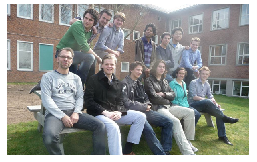Team:Wageningen UR
From 2012.igem.org
TSlijkhuis (Talk | contribs) |
TSlijkhuis (Talk | contribs) |
||
| Line 37: | Line 37: | ||
<b>The Constructor</b><br> | <b>The Constructor</b><br> | ||
An application that assists you in creating your cloning strategies for your iGem project. | An application that assists you in creating your cloning strategies for your iGem project. | ||
| + | [http://socialwur.nl The Constructor] | ||
</div> | </div> | ||
| + | <div class="hidden"> | ||
{|align="justify" | {|align="justify" | ||
| Line 45: | Line 47: | ||
|- | |- | ||
| | | | ||
| - | |||
| - | + | ||
|[[Image:Wageningen_UR_team.png|right|frame|Your team picture]] | |[[Image:Wageningen_UR_team.png|right|frame|Your team picture]] | ||
| Line 54: | Line 55: | ||
|align="center"|[[Team:Wageningen_UR | Team Wageningen_UR]] | |align="center"|[[Team:Wageningen_UR | Team Wageningen_UR]] | ||
|} | |} | ||
| + | </div> | ||
Revision as of 08:39, 16 July 2012
Project description Team Wageningen_UR
Synthetic biological approach for the development of standardized medical delivery systems
Our team will join the competition with a medically focussed project on Virus-Like Paricles (VLPs). VLPs are empty virusses that lack a genetic content, and can therefore not self-replicate. These VLPs can be modified to make vaccines or used as bio-nano carriers for site-specific drug delivery.
The development of conventional vaccines is slow, laborious and costly. VLPs can serve as a cheap and standardized platform for the development and production of vaccines, making preventive healthcare accessible worldwide. Three different viruses will serve as initial workhorses. Cowpea Chlorotic Mottle Virus (CCMV), Turnip Yellows Virus (TuYV) and Hepatitis B (HepB) have been selected for their promising properties in either packaging molecules or modification possibilities on the outside of the particle. The research done on these three VLPs should lead to one standardized tool.
Charged coils applied on the outside of the VLP will serve as a docking site in order to obtain one standardized tool for medical delivery systems. The epitope of interest is fused to the oppositely charged coil designed to connect to the docking site. With this, a Plug and Apply system is designed, creating the desired standardized platform.
Modification of the monomere can inhibit multimerization and with it formation of the VLP. Therefore, tertiary and quarternary protein structure modelling is used to predict whether the modification will inhibit assembly. If the in silico results are positive, the construct will be made and cloned in Escherichia coli.
Formation of VLPs is usually confirmed using Electron Microscopy (EM). This is rather time consuming and expensive, so Dynamic Light Scattering (DLS) is investigated as an alternative method. DLS can provide an indication of VLP formation but conclusive evidence should be obtained by EM.
The formation of the first VLP samples is confirmed by using these two detection methods, and the gene is standardized conform the rules of iGEM. This gene will now serve for further development of the standardized medical delivery systems, making mass development and production of new vaccines possible.
The Constructor
An application that assists you in creating your cloning strategies for your iGem project.
[http://socialwur.nl The Constructor]
 "
"











